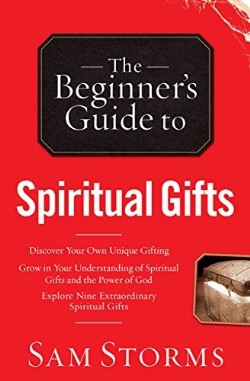Beginners Guide To Spiritual Gifts (Reprinted)
$17.99
Your Gifts Reveal God’s Presence and PowerThe apostle Paul wrote, “There are varieties of gifts, but the same Spirit. . . . To each one is given the manifestation of the Spirit for the common good” (1 Cor. 12:4,7). But what are these spiritual gifts? How do you know if you possess them? And, if you do, how do you use them?In The Beginner’s Guide to Spiritual Gifts, Sam Storms will help you answer basic and foundational questions about the what, why, and how of the unique gifts God gives to each of His children. You will discover the purpose of spiritual gifts in the Church and learn how to identify your special mix of gifting. In addition, you will find out how the Holy Spirit uses the supernatural manifestation of gifts to demonstrate God’s presence and power among His people.God has gifted you . . . now learn how to use His good gifts for His glory!
in stock within 3-5 days of online purchase
SKU (ISBN): 9780764215926
ISBN10: 0764215922
Sam Storms
Binding: Trade Paper
Published: March 2013
Beginners Guide To
Publisher: Bethany House Publishers
Related products
-
7 Last Words
$18.99Based on his talks at New York’s St. Patrick’s Cathedral on Good Friday 2015, the New York Times bestselling author and editor at large of America magazine offers a portrait of Jesus, using his last words on the cross to reveal how deeply he understood our predicaments, what it means to be fully human, and why we can turn to Christ completely, in mind, heart, and soul.
Each meditation is dedicated to one of the seven sayings:
*”Father, forgive them, for they do not know what they do.”
*”Today you will be with me in Paradise.”
*”Woman, this is your son” . . . “This is your mother.”?
*”My God, my God, why have you forsaken me?”?
*”I thirst.”?
*”It is finished.”?
*”Father, into your hands I commend my spirit.”With the warmth, wisdom, and grace that infuse his works, Father James Martin explains why Jesus’s crucifixion and death on the cross is an important teaching moment in the Gospels. Jesus’s final statements, words that are deeply cherished by his followers, exemplify the depth of his suffering but also provide a key to his empathy and why we can connect with him so deeply.
Add to cart1 in stock
-
Hollywood Commandments : A Spiritual Guide To Secular Success
$25.99DeVon Franklin, New York Times bestselling author of The Wait and prominent Hollywood producer, reveals that secular and spiritual success are not opposites. To have one, you need the other.
You can be wildly successful without losing your faith. In fact, your secular success will strengthen your faith if you allow it. Too often we believe that success in secular environments contradicts the core principles of faith, but the opposite is true: Your faith was designed to thrive in the secular world and to transform it as a result. You may never experience the true fulfillment you were created for until you pursue the secular ambitions in your heart.
New York Times bestselling author DeVon Franklin knows this to be true. In The Hollywood Commandments, the prominent Hollywood producer and spiritual success coach reveals 10 life-changing lessons picked-up from his over-twenty-year career in the entertainment business. You won’t learn these lessons in the church yet they will help you achieve an amazing life and thriving career that glorifies God. The Hollywood Commandments will help you:
–Identify how to use what makes you unique to propel your career.
–Overcome fear and build the courage to pursue new opportunities waiting for you.
–Gain the confidence to make important life decisions with greater peace and clarity.
–Negotiate the life and career advancement you deserve.No, you don’t have to work in Hollywood for this book to work for you, these “commandments” apply to every walk of life! If you are stuck, looking for the secrets to advance your career, or have a feeling there’s more to life, this book is for you.
Add to cart1 in stock
-
Mere Christianity
$17.99Arguably the 20th century’s most influential Christian writer, C.S. Lewis sought to explain and defend the beliefs that nearly all Christians at all times hold in common. His simple yet deeply profound classic, originally delivered as a series of radio broadcasts, is a book to be thoroughly digested by believers and generously shared with skeptics. Paperback with French f laps and deckled page edges.
Add to cart1 in stock (additional units can be purchased)















Reviews
There are no reviews yet.